Pakistan- India: issues

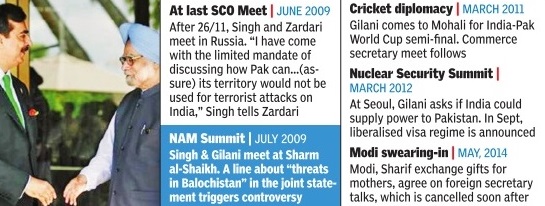
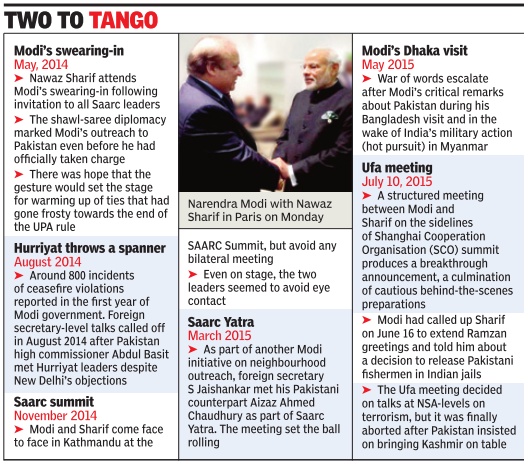

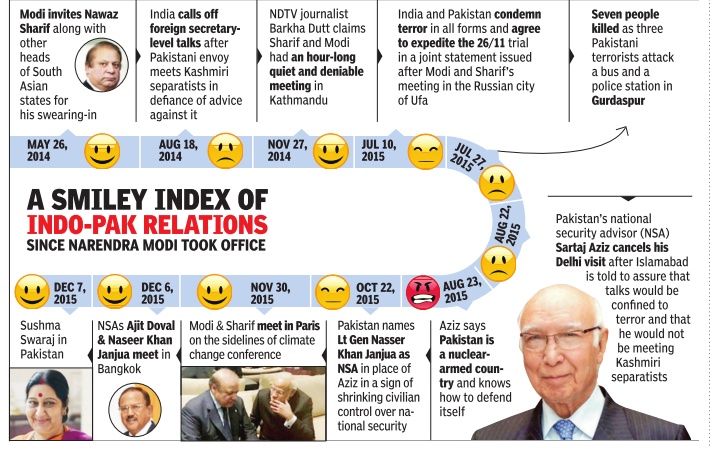
This is a collection of articles archived for the excellence of their content. |
Contents |
A timeline: August 1947-September 2016
Key events in India-Pakistan relations: A timeline, August 12, 2017: The Times of India
August 1947
Britain ends its colonial rule over the Indian subcontinent, which becomes two independent nations - Hindu-majority, but secularly governed India and the Islamic republic of Pakistan. The division, widely known as Partition, sparks massive rioting that kills up to 10 lakh, while another 1.5 crore people flee their homes in one of the world's largest human migrations.
October 1947
The two young nations begin a war over control of Kashmir, a Muslim-majority kingdom ruled by a Hindu maharaja. A UN-brokered cease-fire ends the war in a year with Kashmir divided between them.
January 1949
India and Pakistan agree to a UN Security Council resolution calling for a referendum in which Kashmiris would determine their future; the vote never takes place.
September 1960
India and Pakistan sign a World Bank-brokered Indus Water Treaty governing six rivers, or three rivers each. It is the only India-Pakistan treaty that has held.
August 1965
A second war begins over Kashmir, ending a month later in another UN-mandated ceasefire.
December 1971
A third war is fought, this time as India supports secessionists in East Pakistan. The war ends with the creation of Bangladesh.
July 1972
The countries' prime ministers sign an accord for the return of tens of thousands of Pakistani prisoners of war.
May 1974
India conducts a nuclear test, becoming the first nation to do so that's not a permanent UN Security Council member.
December 1989
Armed resistance to Indian rule in Kashmir begins. India accuses Pakistan of giving weapons and training to the fighters. Pakistan says it offers only "moral and diplomatic" support.
May 1998
India detonates five nuclear devices in tests. Pakistan detonates six. Both are slapped with international sanctions.
February 1999
Indian Prime Minister Atal Bihari Vajpayee rides a bus to the Pakistani city of Lahore to meet with Pakistan counterpart, Nawaz Sharif, and sign a major peace accord.
May 1999
Conflict erupts in Kargil as Pakistani forces and Kashmiri fighters occupy Himalayan peaks. India launches air and ground strikes. The US brokers peace.
May 2001
Vajpayee and Pakistan's President Pervez Musharraf meet in the Indian city of Agra, but reach no agreements.
October 2001
Insurgents attack the legislature building in Kashmir, killing 38 people.
December 2001
Gunmen attack India's Parliament, killing 14. India blames militant groups Lashkar-e-Taiba and Jaish-e-Muhammad, and deploys troops to its western frontier with Pakistan. The standoff ends in October 2002 after international mediation.
January 2004
Musharraf and Vajpayee hold talks, launching bilateral negotiations to settle outstanding issues.
February 2007
A train service between India and Pakistan, the Samjhauta Express, is bombed in northern India, killing 68.
October 2008
India and Pakistan open a trade route across Kashmir for the first time in six decades.
November 2008
Gunmen attack Mumbai, killing 166 people. India blames Pakistan-based terror group Lashkar-e-Taiba.
May 2014
India's new Prime Minister Narendra Modi invites Pakistani counterpart Nawaz Sharif to New Delhi for his inauguration.
December 2015
PM Modi makes a surprise visit to the Pakistani city of Lahore on Sharif's birthday and the wedding of his granddaughter.
January 2016
Six gunmen attack an Indian air force base in the northern town of Pathankot, killing seven soldiers in a battle that lasted nearly four days.
July 2016
Indian soldiers kill Kashmiri terrorist and Hizbul Mujahideen leader Burhan Wani, sparking months of anti-India protests and deadly clashes in the region.
September 2016
Suspected terrorists sneak into an Indian army base in Kashmir's Uri and kill 18 soldiers. Four attackers are also killed. 11 days later, Indian Army said it has carried out "surgical strikes" to destroy terror launch pads across the Line of Control in Pakistan.
1972: Pakistan's pro-West tilt 'stemmed from fear of India'
HIGHLIGHTS
India was very concerned about Pakistan's closeness with China even 34 year ago, newly released declassified CIA documents say
Meanwhile, Pakistan was concerned 'India and the Soviets will cooperate to impose their demands on Pakistan'.
Pakistan's pro-US tilt is the direct result of its "fear of India," says one of the thousands of documents the Central Intelligence Agency (CIA) released earlier this month.
"Pakistan's pro-Western orientation stems from her fear of India and USSR rather than any basic sympathy with capitalism or Christian civilisation. It is more negative than positive," an undated CIA document says. It adds that Pakistan at the time wasn't particularly pleased with the US.
"Pakistan is likely to continue basically pro-Western, despite annoyance at the US part in the UN handling of Kashmir and at the US position on North Africa in the UN", the document says.
A 1983 document also talks of Pakistan's obsession with India.
"Pakistan believes India has never accepted its independent existence and it wants to make it a weak buffer state under Indian hegemony. Islamabad is particularly concerned that India and the Soviets will cooperate to impose their demands on Pakistan," says the document from September 1983. That same document talks of India's concerns about Pakistan-China closeness, US military assistance to Pakistan and interference in peace over the Indian Ocean - all concerns that hold good to this day, a whole 34 years later.
"India views Pakistan's strong ties with China with alarm and charges that Pakistan is using the Afghanistan crisis to strengthen itself against India. It opposes US weapons assistance to Pakistan and wants to maintain the Indian ocean area free of superpower rivalry," the 1983 document says.
As for India, a 1972 CIA document says the intelligence agency believed that Indians had a very real sense of "inferiority". "In order to offset the fear that they really may be inferior, however, Indians are often so defensive - touchy and sensitive - that they appear to be offensive, that is assertive, vain, and arrogant," says the document. It then talks of India's "crushing victory over Pakistan" in the December 1971 war.
"National achievements, especially the crushing victory over Pakistan in December 1971 and the apparent ability to create a nuclear weapon, have tended to buoy self-confidence, but euphoria is transient and the feelings of national inferiority are deeply imbedded," the document says.
Infiltration along Indo-Pak border: Jan-July 2015
See graphic
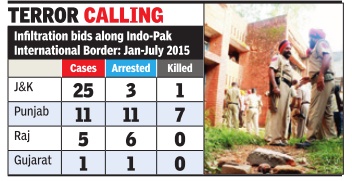
Nuclear facilities
1980: CIA thought Indira wanted to bomb Pakistan’s N facilities
The Times of India, Sep 01 2015
Indira wanted to nip Pak's nuclear dreams in the bud
India was cognizant of the threat from Pakistan's nuclear weapons program and then Prime Minister Indira Gandhi may have considered eliminating it when she returned to office in 1980 long before it neared fruition, a CIA assessment from that era has revealed. The CIA report, declassified in June 2015 and first reported by PTI, says Mrs Gandhi considered the option follow ing the pros pect of the US providing F-16 fighter jets to Pakistan, giving Islamabad the possible means to deliv er nuclear weapons.
“In the extreme case, if Indian concerns increase over the next two or three months, we believe the conditions could be ripe for a decision by Prime Minister Gandhi to instigate a military confrontation with Pakistan, primarily to pro vide a framework for destroying Pakistan's nuclear facilities,“ says a redacted version of the 12page document that was declassified this year. The report also says Mrs Gandhi was ready to order a resumption of nuclear tests.
P M Gandhi probably has not made a decision to exercise a military option against Pakistan. In the extreme case, if India's concern about deliveries of F-16s to Pakistan increases before the optimum time for exercising the military option (in October or November according to one report), the conditions could be ripe for Prime Minister Gandhi to carry out the contingency strike plan,“ the largely speculative assessment added.
According to the report, as Pakistan was in an advanced stage of producing plutonium and highly-enriched uranium for use in nuclear weapons, Gandhi evidently responded to the threat by authorizing Indian nuclear test preparations.
“In February (1981), exca vation was begun in the Thar desert to permit the under ground explosion of an Indi an test device on short no tice,“ the CIA said, adding that in May preparations had been completed by India for a 40-kiloton nuclear test. The CIA said India reportedly was to explode the device about one week after the expected Pakistani test. “Evidently, the Indian government calculated that a Pakistani nuclear explosion per se would not constitute a na tional security threat, and that the damage to India's image of pre-eminence in the region could be minimised by a resumption of the peace ful nuclear explosive (PNE) program,“ the CIA said.
Both assessments, largely in the speculative realm given lack of affirmation from New Delhi, redefines some of the known discourse on the subject.
Previous accounts have suggested Mrs Gandhi may have had the option of elimi nating Pakistan's nuclear programme with Israeli help as late as 1984. Some reports have said Israel approached New Delhi with the offer to bomb Pakistan's main nuclear facility at Kahuta if India offered its jets re fueling assurance, but India demurred.
Pakistan's runaway nu clear program has now racked up more than 120 nu clear weapons in an unstable toxic country wracked by ethnic and sectarian hatred.
1983: Raja Ramanna warned Indira
The Times of India, Sep 02 2015
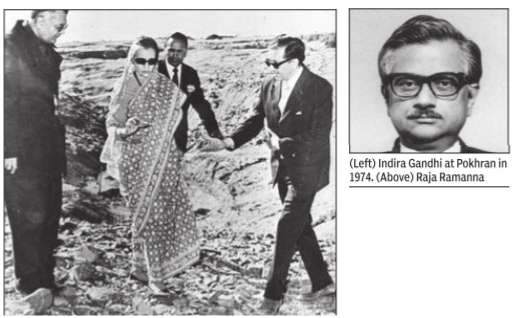
Srinivas Laxman
How the father of Indian N-bomb stalled strike on Pak nuclear sites
Ramanna got Indira to abort bid in 1983
In a strange twist of irony , the person who was responsible for stalling India's plan to bomb Pakistan's nuclear weapons facilities in 1983 was none other than the father of the Indian nuclear bomb, Raja Ramanna. Ramanna himself had confirmed this to TOI on two occasions in private conversations after his retirement as chairman of the Atomic Energy Commission in 1987.He passed away in Mumbai on September 24, 2004.
Though Ramanna had de clined to go into specifics, he had recalled that in 1983, when he was in Vienna to attend an International Atomic Energy Agency meet, he was “warned“ by ex-chairman of the Pakistan Atomic Energy Commission Munir Ahmed Khan that if India hit its nuclear facilities, Pakistan would launch a retaliatory strike at BARC, Trombay , in Mumbai, the heart of India's nuclear weapons programme.
Ramanna immediately informed Indira about the dangerous consequences of bombing Pakistan's nuclear establishment and the operation was stopped.
The story goes that when Khan was attending the IAEA meet, he received a classified coded message about India's plans through the Pakistani ex-ambassador to Vienna, Abdul Sattar. That night, Khan invited Ramanna for dinner at the Imperial Hotel and the two arch rivals talked for a while. Then the moment arrived when Khan decided to say why he had suddenly called for the dinner meeting: it was not to exchange pleasantries but to deliver a stiff warning about the retaliatory strike on BARC.
Whether Ramanna knew of this plan earlier remains unclear. But the first thing he did on his arrival from Vienna was to rush to Indira. He conveyed to her Khan's warning and succeeded in making her scrap the idea altogether.
In the book `Nuclear Deception' by Adrian Levy and Catherine Scott-Clark, it is stated that India's plan was code-named `Osirak Contingency', after the Israeli bombing of the Iraqi nuclear weapons plant at Osirak, 18 miles south of Baghdad, in 1981.
According to the book, exIAF chief Dilbaug Singh was to have commanded the Pakistani operation and had ordered a Jaguar squadron to practice low-level flying with 2,000-pound bombs -a squadron had been kept on standby at the Jamnagar air force base to carry out the attack at a moment's notice.
Then, when the CIA got hint of India's plans, it alerted the US administration.The US state department then flashed a strong message to India: “The US will be responsive if India persists.“
Ramanna's message to Gandhi quoting Khan along with the US state department warning made Gandhi evetually scrap the operation, which upset both Indian military planners and Israel.
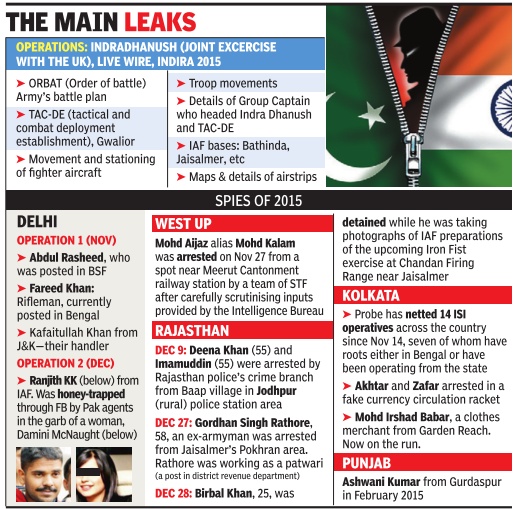
Raja Ramanna stalled India's plan?
The Times of India, Sep 02 2015
Raja Ramanna foiled strike on Pak's N-sites Raja Ramanna, father of the Indian N-bomb, was also the person responsible for stalling India's plan to bomb Pakistan's nuclear weapon facilities in 1983, re ports Srinivas Laxman. Ramanna had con firmed this to TOI in pri vate conversations after he retired from the Atomic En ergy Commission in 1987.
Ramanna, who passed away in 2004, had said that he was “warned“ by former chair man of Pakistan Atomic Energy Commission Munir Ahmed Khan in 1983 that if India hit Pakistan's nuke weapons facilities, it would launch a retaliatory strike on BARC, Trombay . Raman na apparently informed then Prime Minister Indira Gandhi about the conse quences and the operation was stopped.
Terrorism
See also: Terrorism, sponsored by Pakistan
Govt against declaring Pak a terror state
The Times of India, Feb 22, 2017
The government has conveyed to the Rajya Sabha secretariat its opposition to a private member's bill seeking to declare Pakistan as a terror-sponsoring nation. “India can't declare any country a `terror state' as it has to maintain diplomatic relations with all countries. Besides, in principle it is very rare that the government supports any Private Member's Bill,“ said a home ministry official. TNN
Russia
Pakistan as buffer against Russia
The Times of India, Sep 02 2015
Rajiv saw Pak as `strategic buffer' against USSR: CIA files
Contradicting perceived proximity to the Soviet Union in the Cold War era, India under the then PM Rajiv Gandhi had toyed with the idea of supporting antiRussian civilian groups in Pakistan if the then Zia regime was thrown out by Moscow, a recent declassified CIA document has claimed. According to CIA documents of the era, which were recently declassified, Gandhi wanted non-interference from both the United States and the then USSR.
While taking note of the historic India-USSR relationship in particular in the defence field, the CIA report of April 1985 noted that India is likely to become increasingly concerned about long-range Soviet intentions in the region. “New Delhi regards Pakistan as a strategic buffer against the USSR and would oppose Moscow's effort to dominate Pakistan. New Delhi and Moscow would find themselves supporting rival factions within Pakistan,“ said the report.
Spying by Pakistan
Pakistani spy modules overstaying in India
December 10, 2014
The home ministry said Pakistan's ISI had been indulging in espionage activities in India, and that 33 espionage modules backed by the neighbouring country had been busted over the past three years. In a written reply to a question in Lok Sabha, minister of state for home affairs Haribhai Parthibhai Chaudhary said as many as 50 espionage agents, including some ex-babus of Indian government, had been arrested as part of the crackdown on Pakistan-backed modules.
“Pakistan intelligence agencies, particularly the Pakistan ISI, has come to notice for conducting espionage activities in the country... during the period from January 2011 to November 2013, 33 Pakistan-backed espionage modules were neutralized in India, resulting in the arrest of 50 espionage agents, including some retired Indian government officials,“ Chaudhary said.
Pakistani spies in India
Dec 24 2014
Four men in forces spying for Pak caught in last 2 yrs
Four armed forces personnel have been arrested in recent times for spying for Pakistan, government told Parliament. One of the accused was dismissed from service later.
Defence minister Manohar Parrikar told Rajya Sabha that three personnel were nabbed just this year while one was arrested in 2012. “Appropriate action has been taken against the accused as per law and laid down procedure in this regard. One accused has been dismissed from service. Other cases are at different stages in civilmilitary courts,” he said.
To a question on what action the government has proposed to take to prevent such cases, the Minister said that armed forces have counter intelligence set up in place to prevent such espionage cases. He said advisories have also been issued to sensitize and educate armed force personnel and institute appropriate mechanism to prevent recurrence of such incidents.
Meanwhile, the government told Lok Sabha that six people have been arrested this year for indulging in espionage for Pakistan in India. Among those nabbed, five are Indians and one is a Sri Lankan national.
“During the current year-2014 (till December 17), six Pak espionage modules have been neutralized in the country resulting in the arrest of six persons along with information and documents relating to various establishments in the country. Out of these six accused, five are Indian and one is a Sri Lankan national,” Minister of state for home, Haribhai Parathibhai Chaudhary said in a written reply.
He said the government is pursuing a well coordinated approach to tackle spying in the country which include strengthening vigilance on the borders to check infiltration, close interaction and coordination between different agencies, strengthening of state police and forces.
See also
Pakistan- India economic relations
Pakistan- India: issues
Pakistan- India: Cease-fire and its violations
India- Pakistan: Nuclear weapons testing
Nuclear arsenals: India, Pakistan
and many more articles, especially about the 1965 and 1971 wars, The Kargil war of 1999, 1947...